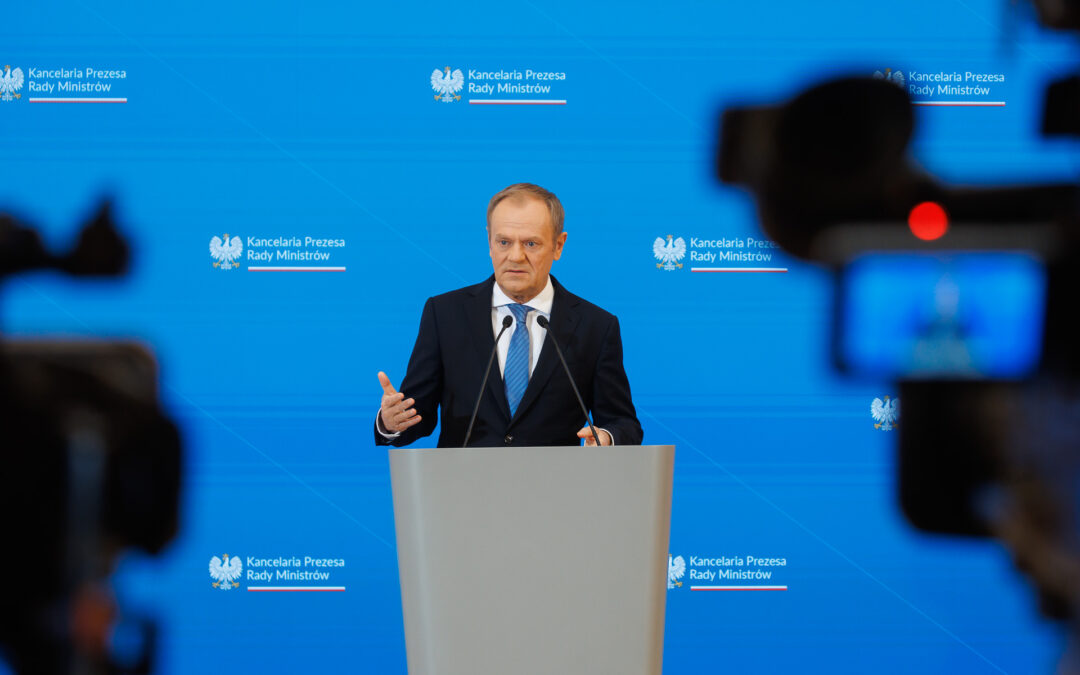Poland will classify border crossings with Ukraine and some nearby roads and railways as critical infrastructure, Prime Minister Donald Tusk has announced. The move is aimed to reduce problems caused by mass blockades by farmers in protest against Ukrainian agricultural imports and EU climate policy.
The move will give “a 100% guarantee that military and humanitarian aid will reach the Ukrainian side without any delays”, said Tusk today, adding that the changes would be implemented within “a few hours”.
Tusk’s decision has been criticised by opposition parties, with his predecessor as prime minister, Mateusz Morawiecki, pointing out that it will mean “in practice a forcible blockade of the farmers’ protest”.
Tusk also today rejected a proposal by Ukrainian President Volodymyr Zelensky for the pair to meet at the border to discuss the crisis. Tusk noted that talks between the two governments are already scheduled for March.
Premier @DonaldTusk w #KPRM: Nie możemy pozwolić na to, aby przy granicy polsko-ukraińskiej – korzystając z protestów rolników – aktywni byli ci, którzy jawnie i bezwstydnie wspierają Putina, służą propagandzie rosyjskiej i kompromitują państwo polskie, kompromitują nas, Polaków,…
— Kancelaria Premiera (@PremierRP) February 22, 2024
“It is very important that the Ukrainian side and our allies know that the Polish state is enforcing everything that needs to be done on this issue,” Tusk said during a press conference, quoted by broadcaster TVN24.
The prime minister noted that the changes would mean “a different organisational regime at border crossings and on access roads and tracks to the border with Ukraine”. But Poland would try to ensure that traffic would flow without additional delays, he added.
Tusk also called for the domestic and international debate to separate the issues of “outright support for Ukraine and the protection of Polish farmers and the Polish market from the negative effects of trade liberalisation with Ukraine”.
Donald Tusk has rejected @ZelenskyyUa's proposal for a bilateral meeting at the border before 24 February, the anniversary of Russia's full-scale invasion.
The governments of both countries are scheduled to meet on 28 March in Warsaw, notes Tuskhttps://t.co/wTDEuTgh6q
— Notes from Poland 🇵🇱 (@notesfrompoland) February 22, 2024
“We will seek protective solutions for Polish farmers, both through national methods, by using national resources, and through further negotiations with Ukraine and European institutions,” he said.
Tusk added, however, that Poland “cannot allow at the Polish-Ukrainian border – taking advantage of the farmers’ protests – those who openly and shamelessly support Putin, serve Russian propaganda and discredit the Polish state”.
Those remarks follow comments yesterday by Poland’s foreign ministry suggesting that some elements within the farmers’ protest may be influenced by “Russian agents” after pro-Putin and anti-Ukrainian banners were displayed.
Polish farmers' protests may be "influenced by Russian agents", says Poland's foreign ministry after a tractor displayed a banner saying "Putin, sort out Ukraine, Brussels and our government"
Another suggested kicking "ungrateful" Ukrainians out of Polandhttps://t.co/kfBURlMbjF
— Notes from Poland 🇵🇱 (@notesfrompoland) February 22, 2024
Some commentators have also pointed out that some of the methods used by the farmers during the protests, such as blocking border crossings, transport hubs, access roads to railway transshipment stations and ports, disrupt vital infrastructure on NATO’s eastern flank.
“Is the blockade of railways and seaports also a fight for agriculture or already sabotage of the logistics of NATO’s eastern flank?” asked Wojciech Jakóbik, editor-in-chief of the BiznesAlert news service, which focuses on energy, infrastructure and security.
“At this kind of event, especially one that arouses strong emotions, there may be those who want to take advantage of the situation to harm us, and unfortunately this must be borne in mind,” said Michał Piekarski, a security researcher of Wrocław Univerisity.
Blokada kolei i portów morskich to też walka o rolnictwo czy już sabotaż logistyki wschodniej flanki NATO? pic.twitter.com/2qEJrU01v1
— Wojciech Jakóbik (@wjakobik) February 20, 2024
The decision to include border crossings in the list of critical infrastructure has been criticised by figures from the national-conservative Law and Justice (PiS), the main opposition party, and the far-right Confederation (Konfederacja).
“Including the border crossing with Ukraine on the list of critical infrastructure means in practice a forcible blockade of the farmers’ protest,” wrote Morawiecki of PiS on social media. “Tusk once again wants to solve the problem by escalating tension. Dear farmers, don’t give up!”
Confederation MP Michał Wawer expressed a similar sentiment, calling Tusk’s decision “an obvious move to allow uniformed services to disperse the farmers’ strike”.
Tusk ogłasza wprowadzenie przejść granicznych na listę infrastruktury krytycznej, czyli jak rozwiązać protest bez rozwiązywania go.
Zboże ma jechać z Ukrainy bez przeszkód!
Państwa już nie mamy. pic.twitter.com/A89i2ATaE2— Rafał Mekler (@MeklerRafal) February 22, 2024

Notes from Poland is run by a small editorial team and published by an independent, non-profit foundation that is funded through donations from our readers. We cannot do what we do without your support.
Main image credit: Kancelaria Premiera/ Flickr

Alicja Ptak is deputy editor-in-chief of Notes from Poland and a multimedia journalist. She has written for Clean Energy Wire and The Times, and she hosts her own podcast, The Warsaw Wire, on Poland’s economy and energy sector. She previously worked for Reuters.



















